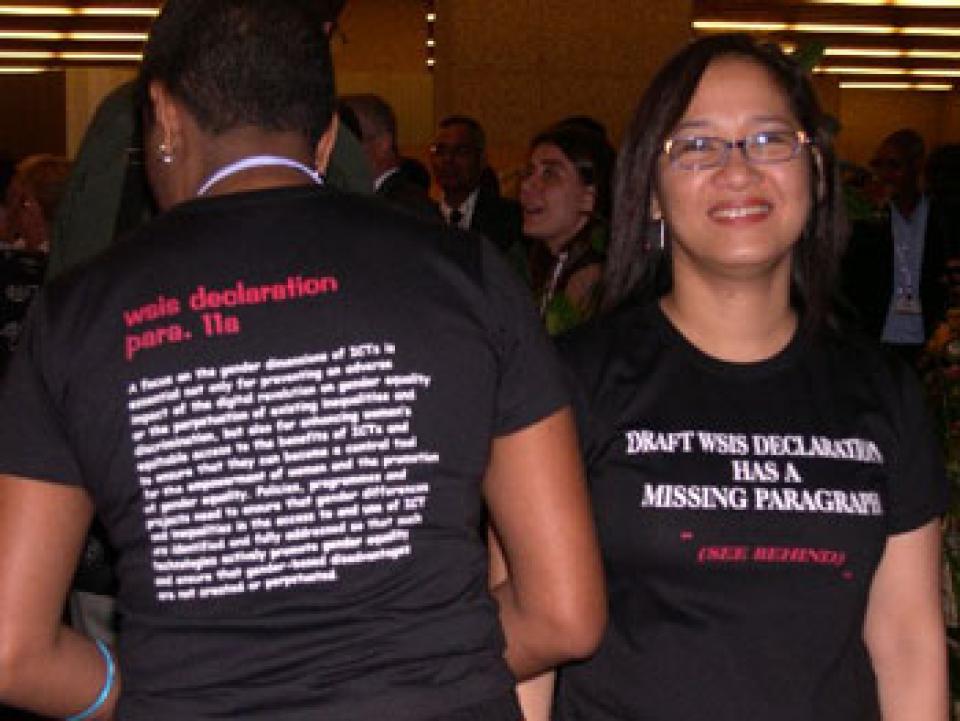
Fifteen years ago, a small but determined group of women's rights and media/ICT activists fought to include media and ICTs as one of the 12 critical areas of concern in the fourth UN World Conference on Women Beijing Platform For Action .
Remarkably visionary for it's time, the text, binding on all governments, called for the universal recognition of the rights of all women to participate in and 'have access to expression and decision-making in and through the media and new technologies of communication'.
Ten years ago, armed with 'the 'J' Chapter', (as it's still called), an embryonic global network of women's rights and gender advocates took up the challenge of integrating those rights into the full agenda of the first phase of the World Summit on the Information Society (WSIS) process.
Early in the process, they recognised the oh-so-common danger of being ghettoised into a 'feminist' corner. That place that none but themselves visited, where they were politely listened to, but largely ignored.
Not for these feisty campaigning veterans. They went out and inserted themselves into every aspect of the agenda. Working with other civil society activists, they formed an integral part of the advocacy framework that called for human rights, sustainable development, social justice, and gender equality at the core of issues ranging from access to infrastructure to intellectual property, disability rights to ICTS for development, access to knowledge to capacity building, privacy and security to cultural and linguistic diversity. When their advocacies fell on deaf ears, they reverted to tried and tested feminist practice, disrupting the space, demanding attention, and quite literally wearing their message on their sleeves (well, upper bodies!) through a bold, creative and show-stopping 't-shirt' campaign. Without the benefit of statistics, it would be fair to say that women were reasonably well represented, certainly amongst civil society, on panels, main sessions, working groups, drafting committees and so on, and their impact – on both substantive issues and procedural processes - was significant.
The second phase of the WSIS was far more challenging. The narrower agenda focus – financing the development of the internet, and governance of the internet – made the process far less accessible or appealing to many who had participated in the networks that had developed and coalesced so strongly during the first phase. This was particularly problematic in relation to internet governance debates, which were dominated by geopolitical power politics concerning which government or governments controlled the 'root servers', the 'root zone file' and the allocation of IP numbers.
The dominance of this issue (over and above all others) and the inability of governments to resolve it during WSIS, led to the establishment, of the Internet Governance Forum. But, it also obscured the fact that internet governance was about a lot more than money and geo-politics – that internet governance encompasses the entire body of rules, norms, policies and practice that shape and govern the development, use and evolution of the internet.
At the close of the second phase of WSIS in Tunisia, and the commencement of the IGF, it would also be fair to say that, with the exception of a very small group of women who felt comfortable with the narrow Internet Governance agenda, women's participation and representation was a shadow of that we saw during the first phase. Why was this?
My observation is that the obscuring of critical issues for women's rights activists in internet governance combined with the culture of the IGF (men in suits, techno-babble, non adversarial discussion rather than action oriented outcomes and so on) made the IGF both an uncomfortable space for women's rights advocates, and made it almost impossible to see 'the gender' in the internet governance agenda.
However, during the past two years (in particular) of the Internet Governance Forum we have seen – yet again – a small but determined group of women's rights and gender advocates, increasingly grappling with both the unique environment of the IGF and finding those points of intersection between issues critical to women's rights advocates and the internet governance agenda.
The issues that have provided these intersections have been around violence against women and ICTs, protection of women and children, content regulation, censorship and sexuality rights.
The Association for Progressive Communications has been doing research, networking and advocacy in these areas through three initiatives – 'Take Back the Tech' and MDG3 - looking at the connection between ICTs and violence against women with a goal to ending violence against women - and EroTICs - an exploratory research project that looks at how emerging debates and the growing practice of regulation of online content either impede or facilitate different ways women use the internet and the impact on their sexual expression, sexualities and sexual health practices, and assertion of their sexual rights.
Various workshops have been held at the last five IGFs around these issues. They have provided opportunities for women activists from many countries to share their research findings, express their opinions, discuss and debate with allies and adversaries and present recommendations in what is considered to be an important global advocacy space.
The energy that surrounded these workshops during the most recent IGF was evident in many ways. As I sat listening to a session debrief with women from Malaysia, Uruguay, Lebanon, South Africa, New Zealand, India, Brazil, Pakistan and the DRC, I was in no doubt that I was listening to the next generation of women's rights activists.
Whereas in the past, women's rights activists have tended to focus on issues directly related to their advocacy, this year, women were reporting with gusto, enthusiasm, outrage and humour on sessions ranging from 'Cloud Computing' to 'Access and Youth', 'Critical Internet Resources', 'Social networking' and reports from national and regional IGFs – and seeing the gender agenda where-ever they went. Their passion to express feelings, reflections, assessments and analysis is evident in the numerous blog posts and the largest 'hash-tag' twitter cloud for the IGF.
There is still a long way to go – women's rights activists need to be involved in setting the agenda, not accepting it. Participation by women in the IGF across the board is still abysmal, though increasing with the Vilnius representation at 36% , but still small for women from developing countries. Much more could be made of the national and regional IGFs – building connections with local women's rights groups, bringing them into the local processes, improving representation on panels, workshops and in the Multi-stakeholder Advisory Group. Creating a more inviting IGF space, using creative discussion and debate formats, changing the culture (no ties?) and increasing opportunities for women in the various capacity building initiatives that exist, to name but a few.
Reading the transcript of the final gathering of the Gender Dynamic Coalition, I had a sense of renewed energy, new interest, taking stock, re-grouping and getting ready to shape a whole new approach to gender advocacy in the IGF. Of course, it's often the case that you ride on the adrenalin of a successful event, run ahead of yourself setting all manner of unrealistic goals and targets, Then everyone goes home, and not much happens.
But, there was something about the energy women's rights activists created in this year's IGF, and I'm looking forward to seeing the evolution of a new gender agenda for the IGF.
Karen is the manager of APC's strategic technologies and network development programme. In 1993, she formed (along with other women colleagues from the APC) the APC Women's Networking Support Programme. In 1995, APC WNSP led an all women team of 40 to the UN Fourth World Conference on Women, where they provided email and web access to over 10,000 delegates. With other women's rights groups, the APC WNSP also successfully lobbied for the inclusion of 'Media and Communications' as a new chapter in the Beijing Platform for Action – the first global intergovernmental policy reference the importance of women's rights to access new technologies.
Karen coordinated the APC WNSP from 1996 to 2004. Since 2004, Karen has managed various national, regional and global ICT policy advocacy and capacity building projects and processes for APC. This included coordination of APC's participation in the WSIS (World Summit in the Information Society), the Internet Governance Forum (IGF) and OECD meetings. She is currently a trustee of Privacy International (an international privacy rights and civil liberties watchdog based in the UK), was a member of the WSIS Working Group on Internet Governance (WGIG) and was awarded the Anita Borg Social Impact Award with the APCWNSP in 2004.
- 8706 views






Add new comment